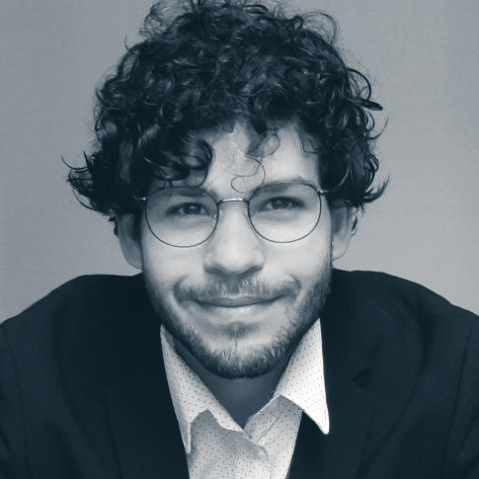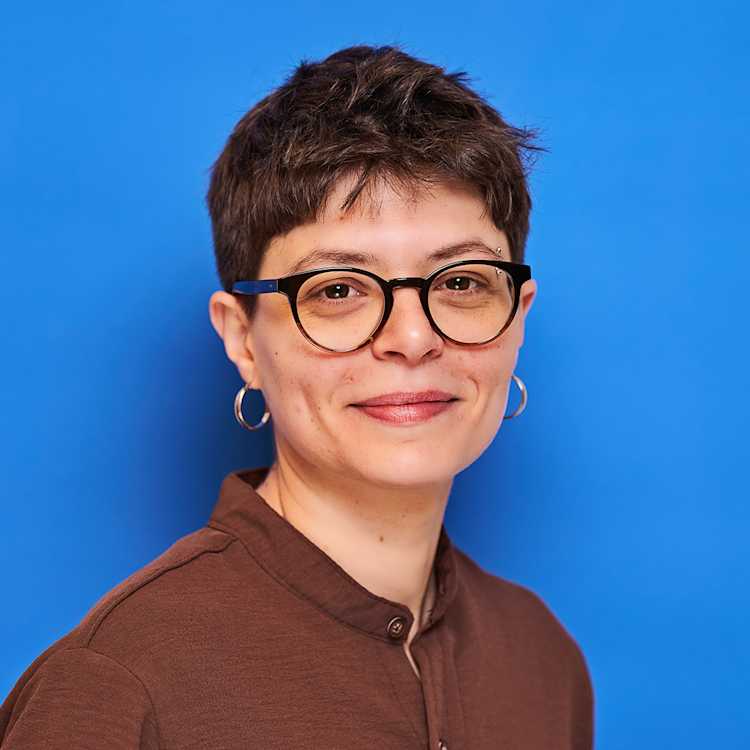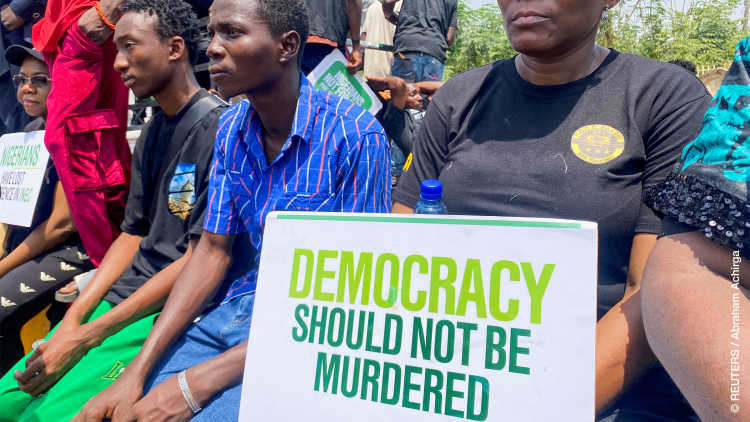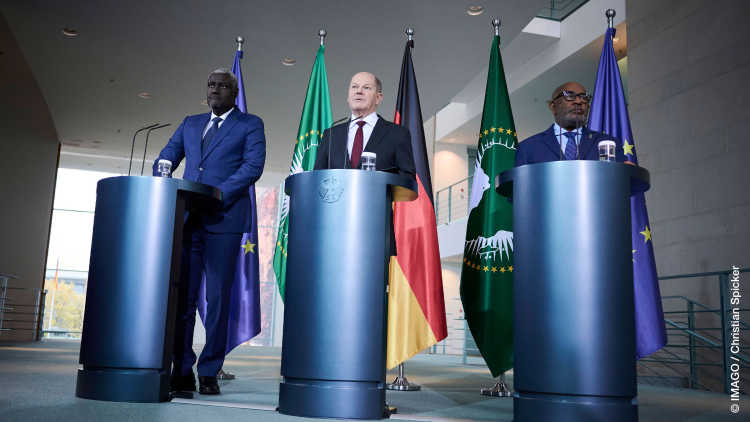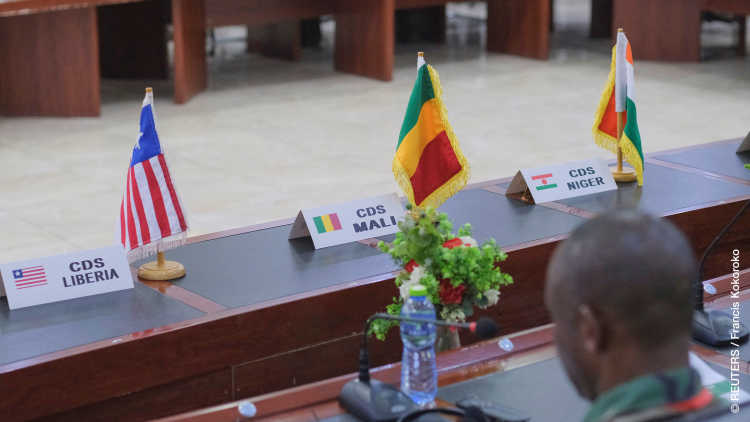- Startseite
- Publikationen
- GIGA Focus
- South Africa’s Watershed Election: The Dawn of Coalition Politics
GIGA Focus Afrika
South Africa’s Watershed Election: The Dawn of Coalition Politics
Nummer 3 | 2024 | ISSN: 1862-3603

On 29 May 2024, South Africa experienced a seismic moment as the African National Congress (ANC) lost its absolute majority for the first time since 1994. This pivotal outcome signals, amid profound domestic crises and significant international challenges, a major shift in South Africa’s domestic political landscape. Yet, the country’s foreign policy orientation is likely to remain intact.
South Africa faces the prospect of its first coalition government at a time when decisive action is needed to combat slow economic growth, rolling power blackouts, high crime rates, and stubborn poverty.
Despite its severe losses, with a vote share of 40.2 per cent the ANC remains the country’s biggest party. In his likely second, and final, term in office, President Cyril Ramaphosa must act decisively to redeem the ANC in the eyes of voters.
The newcomer uMkhonto weSizwe (MK) Party was the clear winner of the ANC’s lost support, having secured 14.6 per cent of the vote. Endorsed by former President Jacob Zuma, the MK Party displaced the Economic Freedom Fighters as South Africa’s third-biggest political party. The popularity of the main opposition, the Democratic Alliance, stayed steady with only a slight increase of 1 per cent in its vote share.
A challenge facing the new coalition government is the need to reconcile South Africa’s competing foreign policy goals: namely, to promote a rules-based international order while also strengthening Africa’s global position and South–South cooperation.
Policy Implications
The European Union and Germany have a preeminent interest in collaborating with South Africa. The country is an important democratic emerging power and economic partner in Africa. There is potential for mutual benefit in the pursuit of shared values and initiatives, such as promoting a rules-based multilateral system, addressing climate change, and advancing the transition to renewable energy.
The Lay of the Land: The South African 2024 Elections
On 29 May 2024, an embattled African National Congress (ANC) lost its absolute majority for the first time since the country’s democratic transition out of Apartheid in 1994. The inauguration of Nelson Mandela as the first president of the democratic country ushered in three decades of ANC electoral dominance in South Africa’s proportional representation parliamentary system. Due to the party’s stronghold in parliament up until these elections, whoever has been the party’s president has been the president of the country. Nonetheless, these elections saw the ANC lose its absolute majority for the first time, down from 57.5 per cent to 40.2 per cent of the National Assembly. This drastic decline in popularity was at the lower end of the most – from the ruling party’s perspective – pessimistic of predictions. The ANC must now enter the country’s first-ever post-Apartheid national coalition government. Given the ruling party’s substantial losses, it will not suffice – as many observers had predicted – to form a coalition with several smaller parties that can be dominated more easily.
The recent election was extremely contentious. It saw the proliferation of new political parties, shifting political alliances, and, for the first time post-1994, the inclusion of independent candidates. Highly varied predictions on the likely outcomes existed prior to election day (Verwoerd 2024). Nonetheless, established pollsters, such as Ipsos and MarkData, consistently reported that voters’ support for the ANC hovered between 40 and 45 per cent. Although such results would be welcomed by many political parties contesting elections in democratic countries around the world, this marked a major decline from the ANC’s 57.5 per cent vote share in the previous national election of 2019.
Yet, opposition parties have historically been unable to capture the public’s vote despite their grievances with the ANC. The main opposition party, the centrist Democratic Alliance (DA), boasts clean audit records in local governments where it holds an absolute majority, such as the Western Cape Province, the Cape Town metropole, and George municipality. However, it is hamstrung by perceptions of its being a white and elitist party and accused of giving better service delivery to affluent areas compared to poor communities. Despite the ANC’s poor electoral outcome, the DA only gained 1 per cent more of the vote compared to 2019.
Until these elections, the country’s third-biggest party was the radical, left-wing Economic Freedom Fighters (EFF). Formed in 2013 by Julius Malema after he was expelled from the ANC and removed from his position as its Youth Leader, the EFF presents itself as a militant revolutionary movement pursuing the economic liberation of the masses. The EFF was considered the ANC’s most likely coalition partner by many in the run-up to the elections. However, such an alliance would be counterintuitive for President Cyril Ramaphosa, as it would strengthen the voice of the ANC’s Radical Economic Transformation (RET) faction – which has considerable ideological overlap with the EFF. Ramaphosa secured a decisive victory within the ANC’s National Executive Committee over the RET fraction in 2022, and it seems unlikely that he would compromise this power within the ANC by entering a national coalition that could empower his RET rivals.
Anticipating the ANC’s diminished support in the 2024 elections, new political parties such as ActionSA, Build One South Africa, and Rise Mzansi sought to capitalise on the ANC’s governance failures by campaigning on promises of a united, prosperous South Africa. However, they enjoyed only limited electoral appeal. More than 50 parties contested the elections; besides the four strongest ones, however, the remaining hopefuls claimed just 13.9 per cent of the vote combined.
The only newcomer of significance was the uMkhonto weSizwe (MK) Party. It was only formed in December 2023 and endorsed by controversial former President Jacob Zuma. One week before the elections, the Constitutional Court ruled that the former president was ineligible to sit in Parliament again due to his conviction in 2021 for contempt of court. Nonetheless, it was Zuma’s face that appeared on the ballot sheet. The MK Party’s final outcome of 14.6 per cent of the vote – mainly due to its strong showing in the populous KwaZulu-Natal Province (KZN) – severely dented the ANC’s vote share. Despite this strong debut, Zuma, in tandem with 20 other parties, demanded that the official announcement of the electoral results be postponed so that their grievances could be deliberated on. Zuma insinuated that violence might erupt if the declaration of results went ahead. No evidence of circumspect election conduct was presented, and the results were confirmed on the evening of 2 June 2024.
The ANC’s Setback: The 2024 Elections Results
Figure 1 below summarises the results for each of the major political parties that contested South Africa’s national elections between 1994 and 2024. Despite the ANC’s declining popularity, the DA was unable to significantly grow its own vote share in the current elections. The EFF lost its anticipated electoral increase (predicted to be around 19 per cent) to the MK Party, which instantly secured its spot as the country’s third-biggest party.
Figure 1. Electoral Results for the South African National Assembly, 1994–2024
Source: IEC 2024.
The ANC’s reduced voter support is a result of several intersecting factors. First, surveys repeatedly show that South Africans are impatient for solutions to the myriad crises they have endured for years now: rolling power blackouts, high crime and violence, extensive unemployment, extreme inequality and poverty, and a government apparatus plagued by corruption (Afrobarometer 2024b). Large parts of the local administration and state-owned companies are dysfunctional due to the widespread misappropriation of public funds, called “state capture.” The ANC has failed to address these critical domestic issues; many South Africans, accordingly, have lost faith that it will ever act decisively to ensure effective service delivery and root out corruption. Second, South Africans born after the democratic transition in 1994 – the so-called born-frees – feel less emotionally attached to the ruling party than their parents, who historically have supported the ANC due to its liberation-struggle credentials.
Third, in the past, disgruntled ANC supporters tended to stay at home rather than vote for an opposition party, particularly in rural areas – the party’s traditional stronghold. Polls show that the extent of South Africans’ faith in the efficacy of elections “to remove non-performing leaders” or that “elections ensure that MPs represent voters’ views” is among the lowest on the African continent (Afrobarometer 2024a). According to survey data, meanwhile,
a third (35%) of South Africans who are registered to vote say that there is no political party that represents their views and there is much uncertainty about the future and apprehension about the possible outcomes of the elections. (Ipsos 2024)
This pessimism explains South Africa’s dwindling voter turnout. Of the total eligible voting population (42.3 million people), only 64 per cent registered to vote in 2024. Further, only 58.6 per cent of registered voters (16.2 million people) actually cast their ballot, marking a substantial decline from the 66 per cent turnout rate in the 2019 election. For perspective, this amounts to only around 38 per cent of the eligible voting population participating in the 2024 national election.
Figure 2. Electoral Turnout Rate as a Proportion of the Eligible Voter Population
Sources: Authors’ own compilation, based on statistics from IEC (2024).
Fourth, in contrast to earlier elections, opposition parties were now also able to use the ANC’s waning support to their advantage, most notably the populist MK Party. It garnered, as noted, 14.6 per cent of the electorate’s support nationally alongside securing the majority of votes (45.4 per cent) in the KZN legislature. This is no small feat: KZN is South Africa’s second-most populous province and is home to about 20 per cent of the country’s citizens (see Figure 3).
Figure 3. Registered Voters per Province
Source: IEC 2024.
Plummeting support among KZN voters for the ANC came as no surprise due to its poor service delivery in the province coupled with the significant support base held by Zuma there. The MK Party decisively dashed the Inkatha Freedom Party’s and the DA’s hopes of governing the hotly contested province. Zuma’s endorsement of the MK Party evidences his political salience despite a series of corruption, rape, and court scandals. The MK Party’s success gives him another avenue into governance in South Africa. Under President Ramaphosa, forming a coalition with the MK Party seems unlikely on the national level. With 21.8 per cent of the vote, the DA remains the main opposition to the ANC; it also maintained its absolute majority in the Western Cape. Ahead of the election, the DA had declared that it would do everything possible to prevent the forming of another ANC-led government. To this end, the DA and several “like-minded” opposition parties joined together in a coalition called the Multi-Party Charter (formerly the “Moonshot Pact”). However, the pact did not come close to securing enough votes to govern the country. As voting results rolled in, the DA announced its willingness to enter coalition talks with the ANC. Currently, the largest opposition party seems the most likely coalition partner for Ramaphosa’s ANC, perhaps with further parties joining.
Within two short weeks, Ramaphosa must select his coalition partner(s) to avoid a political impasse and the emboldening of factional voices within the ANC. He must swiftly find coalition partners what will not weaken his own position within the ruling party, while avoiding major compromises to the ANC’s policy positions. Without any doubt, the 2024 election outcome heralds the end of the ANC’s historically insurmountable political dominance in South Africa.
In Crisis Mode: South Africa’s Domestic Challenges
South Africa needs decisive action to combat slow economic growth, astronomically high levels of inequality, poverty, and crime, as well as rolling power blackouts. The country’s social and economic problems are enormous. According to the World Bank (2022), South Africa is the most unequal society in the world, characterised by the staggering wealth of a few on one side and widespread poverty on the other, particularly in the former “homelands” and townships of the Apartheid era. South Africa’s high rates of violent crime – with, on average, 80 murders and 130 rapes a day – are clearly linked to socio-economic inequality. While the upper middle class has racially diversified to some extent under the democratic dispensation, wealth remains firmly in the hands of a small segment of society.
The COVID-19 pandemic and accompanying lockdown measures further exacerbated severe poverty in the country. The country saw its worst-ever unemployment levels in the last quarter of 2021, at 35.5 per cent. The official unemployment rate rose from 28.7 per cent in 2020 to 32.9 per cent in the first quarter of 2023, using the strict definition of “eligible to work but without a job.” Meanwhile using the expanded definition of “unemployment” – eligible to work, without a job, while actively seeking employment – this figure rises to 41.9 per cent. Almost half of younger South Africans (age 15–34) are currently jobless. According to the World Bank (2024), 62.7 per cent of South Africans were projected to be living below the poverty line in 2023. Sluggish economic growth (0.63 per cent in 2023) dampens hopes of the status quo changing anytime soon.
Conditions for doing business in South Africa have worsened due to intense rolling power cuts (called “load shedding”), which disrupt economic activity while also forcing companies to turn to expensive diesel-run generators to secure their power supply. Load shedding was a major electoral issue, expected to have cost the ANC many votes. In the months leading up to the election, the national electricity utility Eskom stopped its regular, planned power cuts. Some speculated that this was an electioneering tactic by the ANC, and that rolling blackouts would intensify after the results were in. Contrarily, independent experts argued the power utility genuinely is in a more secure, but nonetheless still precarious, position thanks to less demand on the power grid from consumers who have moved to renewable sources. There has also been a slight increase in power supply as well as fewer unplanned maintenance breaks. But South Africans remain weary after enduring years of power cuts (occurring since 2007) – with blackouts lasting for up to eight hours a day in 2023.
Thus, the new South African government must tackle enormous domestic challenges. Job creation, stimulating economic growth, and overcoming embedded structural inequalities. But also addressing the energy crisis, state capture, and the hotly contested issue of immigration and xenophobic violence.
South Africa’s International Posture: A Precarious Balancing Act
While the ANC has been the only political party to rule in the country since the end of Apartheid, its various presidents have left their mark on South Africa’s external relations. The Nelson Mandela government (1994–1999) sought to distinguish democratic South Africa from its Apartheid predecessor by adopting a principle-led foreign policy that positioned Pretoria as a “good global citizen” pursuing human rights for all, both within and beyond its borders. This has seemingly been usurped by other long-standing foreign policy pillars – promoting an African agenda and South–South cooperation – as the foremost aims of South Africa’s international relations under the Thabo Mbeki (1999– 2008), Zuma (2009–2018), and Ramaphosa (2018–) presidencies. The Department of International Relations and Cooperation aims to strengthen the country’s
political, economic and social relations through structured bilateral agreements and high‐level engagements to advance South Africa’s national priorities, the African Agenda and South‐South cooperation. (South African Government 2024)
South Africa is trying to carve out a position for itself as an emerging middle power in a changing, multipolar global order. Exasperated by the lack of institutional reform within such bodies as the United Nations Security Council, South Africa finds allegiance with other Global South states, which are also impatient for a fairer international system. During the Zuma years, South Africa was accused of losing its moral compass in its practising of international relations. South Africa’s withdrawal from the International Criminal Court (ICC) in 2016 seemed to symbolise its shift away from the liberal international order. But the ANC government’s decision was contested by the DA in domestic courts, which ordered the government to rescind its ICC withdrawal as it had not followed proper parliamentary procedures. Following the retracted withdrawal, the ANC’s RET faction continued to advocate for withdrawal from the ICC when Ramaphosa came into office, resulting in the International Crimes Bill being introduced to parliament. However, the bill was subsequently removed from the parliamentary agenda once COVID-19 hit.
In his first term, Ramaphosa sought to redeem South Africa’s international reputation as a principled actor despite internal divisions within the ANC on matters like the ICC. He has adopted a more pragmatic approach to international relations than his predecessors Mbeki and Zuma. Yet, South Africa has struggled to balance its contending foreign policy goals, which has resulted in delicate trade-offs when asserting a principle-based, non-aligned position in response to major international events. Critics assess Ramaphosa as falling short of the standards Mandela set for a human rights-based approach to South African foreign policy. Although, Ramaphosa faces a different global context than Mandela did, with the Western-dominated liberal order under duress. The coming years will likely see even more difficult choices to be made regarding conflicts involving major global powers. Ramaphosa seems steadfast in his desire to safeguard South Africa’s position as a non-aligned state within the global system. But “non-alignment” is a fuzzy term. For some it means completely abstaining from power politics, while for others – like South Africa – it means choosing its foreign policy stances without buckling under external pressure. Two recent global events have received international attention and are evidence of South Africa’s divergent foreign policy practices: the Israel–Hamas conflict in Gaza and Russia’s invasion of Ukraine.
Drawing on its experiences in battling an oppressive Apartheid regime, the ANC has long-standing allegiances with the Palestinian people. Mandela’s famous 1997 statement “[b]ut we know too well that our freedom is incomplete without the freedom of the Palestinians” (Mandela 1997) is popularly cited as evidence of this history. Within South Africa, the Israeli occupation of Palestinian territories has long been referred to as Apartheid – although this label is contested, primarily by domestic Zionist groups.
The Israeli response to Hamas’ terrorist attack on 7 October 2023 catapulted South Africa’s stance on the Israel–Palestine situation into the global arena. The South African government brought a case against Israel before the International Court of Justice (ICJ). It called on the court to decide on six provisional measures “to ensure Israel’s compliance with its obligations under the Genocide Convention” (South Africa v. Israel 2023). The ICJ ordered interim measures to allow humanitarian aid into Gaza and for Israel to minimise civilian casualties. This case is internally consistent with the ANC government’s position regarding the conflict, evidenced by its voting patterns within UN bodies such as the Human Rights Council. Like-minded states and civil society organisations applauded the ICJ case as an instance of South Africa using the international rules-based system to promote adherence to international humanitarian law.
However, this turn of events is not without controversy within South Africa. The DA did not support the ANC-led decision to approach the ICJ. Historically, the DA has supported Israel, and it has called for a more neutral position to be adopted by the South African government following the 7 October attack. Although President Ramaphosa issued a statement criticising Hamas’s use of violence, stating that oppression had to be fought within the parameters of the Geneva Convention, the ANC’s close relationship with Hamas has also drawn criticism from individuals and groups that otherwise support the ICJ case.
It can be expected that an ANC-dominant coalition will seek to continue its call for a two-state solution and its critique of Israel’s military response in Gaza to the attacks of 7 October. This intent was reflected in the ANC’s election manifesto, which stated that solidarity (in the spirit of internationalism) with Palestine, Western Sahara, Cuba, and others would continue. However, should the ANC enter a national coalition with the DA, it might find itself under pressure to be less outspoken in its critique of the Israeli government’s current course of action.
South Africa’s understanding of its moral obligation to be vocal regarding the Israel–Palestine conflict is reminiscent of Mandela’s foreign policy approach. However, as critics have quickly pointed out, South Africa did not adopt the same principled stance when it refused to condemn Russia’s full-scale invasion of Ukraine in February 2022. The Minister of International Relations and Cooperation, Naledi Pandor, was instructed to backtrack on a statement that she issued immediately after the offensive started in which she condemned the attack and called on Russia to withdraw. Instead, the government adopted an official position of non-alignment, stating that “South Africa has not been, and will not be, drawn into a contest between global powers” (Ramaphosa 2023). Such a stance prioritises South Africa’s geopolitical interests (at best, its South–South cooperation priorities) over a principle-led foreign policy.
Furthermore, South Africa’s self-declared neutrality on the Ukraine War is questionable. It allowed the sanctioned Russian cargo ship Lady R to dock at its Simonstown port in December 2022. This later resulted in the United States (US) Ambassador to South Africa accusing it of supplying Russia with weapons – allegations the government vehemently denied. After civil society pressure, South Africa launched an inquiry into the matter, which found no evidence of weapons being loaded onto Lady R. The matter caused diplomatic tension between South Africa and the US, especially since the US Ambassador did not provide evidence to back up his accusations. Nonetheless, the fact that the ship was allowed to dock caused many to question South Africa’s claims of neutrality – even more so when it participated in a ten-day-long naval exercise with Russia and China a few months later.
South Africa’s close ties with Russia (and China) need to be understood within the context of the ANC’s liberation struggle against Apartheid. Russia and China were allies of the ANC – helping to supply arms and training in their efforts to overthrow the minority, segregationist government. This history notwithstanding, in the present day these alliances cause tension for South Africa’s foreign policy practice. Its rights-based foundations conflict with the authoritarian nature of Russia and China, which illustrates how South Africa’s principled foreign policy aims come into conflict with its geopolitical considerations.
The pursuit of a more powerful place within an increasingly multipolar world is in line with South Africa’s prioritising of partnerships with the BRICS countries. Being its only African member, the country chaired the BRICS group in 2023, where it announced the group’s decision to expand. In January 2024, Egypt, Ethiopia, Iran, Saudi Arabia, and the United Arab Emirates joined the now BRICS Plus group. The ANC will likely continue to prioritise partnerships with Global South countries, which is a position shared by many of South Africa’s political parties. However, for the sake of a lasting coalition, the ANC might need to temper its approach, should the DA be their first-choice coalition partner. The DA is more sceptical of the BRICS alliance, and it seeks to promote good relations with so-called Western states alongside South–South cooperation.
South African–German Prospects for Cooperation
Despite the considerable challenges, South Africa’s new government can draw on the country’s progressive constitution, strong judiciary, vibrant civil society, independent media, and battered, but resilient, business sector. In an optimistic scenario, an ANC-led coalition government would provide new impetus to the country’s domestic and international policies. In addition, in his potentially second, and last, term in office, President Ramaphosa might need to focus less on balancing out the different factions within his party and could act more freely than in his first term in office.
South Africa and Germany remain important partners and – despite their different perspectives regarding key policy issues – bilateral relations on the government level remain cordial. There are three areas with particular potential for increased collaboration between South Africa and Germany/Europe in the future:
Tackling global and domestic challenges: In President Ramaphosa’s second term, which seems the most likely outcome at the moment, crucial foreign policy priorities will include upholding international resolutions regarding climate change, steering the green transition domestically and globally, strengthening the African Continental Free Trade Area, promoting peace and security (particularly on the African continent), and strengthening regional integration, while also tackling the hotly contested issue of immigration. There is a natural overlap with key issues facing German foreign policy that can serve as the basis for the two countries’ enhanced cooperation.
Promoting the rules-based international order and multilateralism: South Africa is an important state to engage with, given its prominence as a significant African regional power, its BRICS membership, and its upcoming G20 presidency in 2025. At face value, South Africa and Germany share important attributes. Both countries are democratic middle powers that have promoted a rules-based international order. Both foster the use of international institutions as venues for furthering multilateralism, even if – at times – their policy positions diverge. Currently, both governments seem “to agree to disagree,” as illustrated by their differing positions regarding some ongoing global conflicts. Broader intergovernmental and political relations are solid; most recently, SPD Chairman Lars Klingbeil visited South Africa and met Pandor. Upholding international law represents a durable and shared foundation for further bilateral cooperation in the future.
Strengthen business relations: German companies remain strongly engaged in South Africa. More than 600 German firms operate in the country – they directly employ over 100,000 people, and a similar number indirectly. The new South African government may strive to attract even more foreign direct investment from Germany, and vice versa. Investment in the energy sector and the green transition of both countries – especially to support South Africa’s path towards reliable and clean energy production – seems particularly promising (von Soest 2022). Germany is already a main contributor to the Just Energy Transition Partnership (JUST) that will provide USD 8.5 billion to facilitate South Africa’s transition away from coal. Further support and investment would be in line with Germany’s own foreign policy priorities.
Fußnoten
Literatur
Afrobarometer (2024a), Do Elections Work?, in: The Continent, 161, 11 May, 22, accessed 15 May 2024.
Afrobarometer (2024b), Summary of Results: Afrobarometer Round 9 Survey in South Africa, 2022, Cape Town: Afrobarometer/Institute for Justice and Reconciliation, accessed 29 May 2024.
IEC (2024), Results Dashboard, Johannesburg: Electoral Commission of South Africa (IEC), accessed 3 June 2024.
Ipsos (2024), Support for Political Parties, 6 February, accessed 19 May 2024.
Mandela, Nelson (1997), Address by President Nelson Mandela at International Day of Solidarity with Palestinian People, Pretoria, South African Government Information Website, 4 December, accessed 29 May 2024.
Ramaphosa, Cyril (2023), South Africa Will Not Take Sides in a Contest Between Global Powers, South African Government Information Website, 15 May, accessed 19 May 2024.
South Africa v. Israel (2023), Application Instituting Proceedings and Request for the Indication of Provisional Measures, International Court of Justice, 29 December, accessed 19 May 2024.
South African Government (2024), International Relations, South African Government Information Website, accessed 19 May 2024.
Verwoerd, Melanie (2024), Can We Trust All the SA Election 2024 Opinion Polls?, in: Daily Maverick, 5 May, accessed 19 May 2024.
von Soest, Christian (2022), Home Alone: South Africa’s Regional Predicament, GIGA Focus Africa, 2, Hamburg: German Institute for Global and Area Studies (GIGA), accessed 19 May 2024.
World Bank (2024), The World Bank in South Africa: Overview, accessed on 3 June 2024.
World Bank (2022), Inequality in Southern Africa: An Assessment of the Southern African Customs Union, accessed 3 June 2024.
Redaktion GIGA Focus Afrika
Lektorat GIGA Focus Afrika
Regionalinstitute
Forschungsschwerpunkte
Wie man diesen Artikel zitiert
Rubin, Maxine, und Christian von Soest (2024), South Africa’s Watershed Election: The Dawn of Coalition Politics, GIGA Focus Afrika, 3, Hamburg: German Institute for Global and Area Studies (GIGA), https://doi.org/10.57671/gfaf-24032
Impressum
Der GIGA Focus ist eine Open-Access-Publikation. Sie kann kostenfrei im Internet gelesen und heruntergeladen werden unter www.giga-hamburg.de/de/publikationen/giga-focus und darf gemäß den Bedingungen der Creative-Commons-Lizenz Attribution-No Derivative Works 3.0 frei vervielfältigt, verbreitet und öffentlich zugänglich gemacht werden. Dies umfasst insbesondere: korrekte Angabe der Erstveröffentlichung als GIGA Focus, keine Bearbeitung oder Kürzung.
Das German Institute for Global and Area Studies (GIGA) – Leibniz-Institut für Globale und Regionale Studien in Hamburg gibt Focus-Reihen zu Afrika, Asien, Lateinamerika, Nahost und zu globalen Fragen heraus. Der GIGA Focus wird vom GIGA redaktionell gestaltet. Die vertretenen Auffassungen stellen die der Autorinnen und Autoren und nicht unbedingt die des Instituts dar. Die Verfassenden sind für den Inhalt ihrer Beiträge verantwortlich. Irrtümer und Auslassungen bleiben vorbehalten. Das GIGA und die Autorinnen und Autoren haften nicht für Richtigkeit und Vollständigkeit oder für Konsequenzen, die sich aus der Nutzung der bereitgestellten Informationen ergeben.






